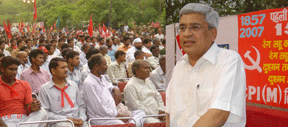 People's Democracy
People's Democracy
(Weekly
Organ of the Communist Party of India (Marxist)
No. 21
May 27, 2007
(Weekly
Organ of the Communist Party of India (Marxist)
|
Vol.
XXXI
No. 21 May 27, 2007 |
1857 Anniversary Observed In Delhi

Prakash Karat addressing the gathering at the historic Khooni Darwaza on May 10
IN the national capital, Delhi, the CPI(M) took out a vigorous procession from the historic Ghanta Ghar to the Khooni Darwaza on May 10, as part of its observance of the 150th anniversary of our first war of independence (1857-58). It will be noted that May 10 was the day our war of independence had started in 1857, the rebel soldiers had captured the city of Meerut and then proceeded towards Delhi.
A pledge to take forward the struggle against
imperialism and to defend the freedom and sovereignty of our country was the
main theme pervading the CPI(M)’s vigorous and energetic programme of the day.
“Red Salute to the Martyrs of 1857” and “Down with Imperialism” were among the
slogans raised by thousands of the processionists. These slogans echoed through
the Walled City that had been witness to the downfall of the British rule in May
1857, its restoration after some months and the whole bloody drama the British
reprisal enacted after the defeat of our freedom fighters.
It will also be noted that Khooni Darwaza, chosen as the venue of the mass
meeting, was the place where the British had ‘gifted’ to the arrested emperor,
Bahadur Shah Zafar, the severed heads of two of his sons.
CPI(M) general secretary Prakash Karat was the main speaker at the rally. In his address, Karat underlined the basic character of the 1857 war as a national revolt with mass participation, despite the weaknesses and limitations of its leadership. He also reminded the fact that the first Indian war of independence in 1857 was the biggest anti-colonial, anti-imperialist war of its time. Noting how the US led imperialist powers are trying to establish their hegemony over the entire globe today, Karat termed the memories of that Great Uprising as all the more relevant for our time. He also drew attention to the growing attacks on the sovereignty of third world countries in the wake of imperialist globalisation, and also to the way our ruling classes and parties are recapitulating to these attacks. Karat therefore urged the people at large to intensify the struggle against imperialism in order to defend our liberty and sovereignty, and to use the episodes of the 1857 war of independence as an unending reservoir of strength and inspiration in this struggle.
Earlier, in his introductory address, CPI(M) state secretary Pushpender Singh Grewal dwelt on the role of the people, particularly the peasants, artisans and wage earners, of Delhi in the 1857 war of independence.
The venue of the meeting also had an impressive exhibition with several visuals regarding the facts of the Great Uprising. The exhibition was prepared and put up by the Safdar Hashmi Memorial Trust (SAHMAT).
Several songs about the Great Uprising prefaced the programme. Noted singer Vidya Shah presented “Hum Hain Iske Maalik, Hindustan Hamara,” the famous marching song of 1857. Artistes of the Jan Natya Manch (JANAM) presented some portions of Kranti Gatha, the long poem on 1857 by late Rahi Masoom Raza, while a group of artistes from Lucknow recaptured the great event through several folk songs and taranas in Bhojpuri, Awadhi and Hindustani dialects.